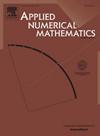Navier-Stokes方程的无散度无单元Galerkin方法分析
IF 2.4
2区 数学
Q1 MATHEMATICS, APPLIED
引用次数: 0
摘要
本文提出了一种有效的无散度无单元伽辽金(DFEFG)方法,用于不可压缩Navier-Stokes方程的数值分析。该方法采用无散度移动最小二乘(DFMLS)近似,得到无散度速度场的无网格近似。首先分析了DFMLS近似的性质、稳定性和误差,然后从理论上推导了DFEFG方法的稳定性和误差估计。最后,数值结果验证了所提方法的有效性和理论分析的正确性。本文章由计算机程序翻译,如有差异,请以英文原文为准。
Analysis of a divergence-free element-free Galerkin method for the Navier-Stokes equations
In this paper, an efficient divergence-free element-free Galerkin (DFEFG) method is proposed for the numerical analysis of the incompressible Navier-Stokes equations. In this method, a divergence-free moving least squares (DFMLS) approximation is used to obtain the meshless approximation of the divergence-free velocity field. The properties, stability and error of the DFMLS approximation are analyzed firstly, and then the stability and error estimation of the DFEFG method are derived theoretically. Finally, numerical results demonstrate the efficiency of the proposed methods and verify the theoretical analysis.
求助全文
通过发布文献求助,成功后即可免费获取论文全文。
去求助
来源期刊

Applied Numerical Mathematics
数学-应用数学
CiteScore
5.60
自引率
7.10%
发文量
225
审稿时长
7.2 months
期刊介绍:
The purpose of the journal is to provide a forum for the publication of high quality research and tutorial papers in computational mathematics. In addition to the traditional issues and problems in numerical analysis, the journal also publishes papers describing relevant applications in such fields as physics, fluid dynamics, engineering and other branches of applied science with a computational mathematics component. The journal strives to be flexible in the type of papers it publishes and their format. Equally desirable are:
(i) Full papers, which should be complete and relatively self-contained original contributions with an introduction that can be understood by the broad computational mathematics community. Both rigorous and heuristic styles are acceptable. Of particular interest are papers about new areas of research, in which other than strictly mathematical arguments may be important in establishing a basis for further developments.
(ii) Tutorial review papers, covering some of the important issues in Numerical Mathematics, Scientific Computing and their Applications. The journal will occasionally publish contributions which are larger than the usual format for regular papers.
(iii) Short notes, which present specific new results and techniques in a brief communication.
 求助内容:
求助内容: 应助结果提醒方式:
应助结果提醒方式:


